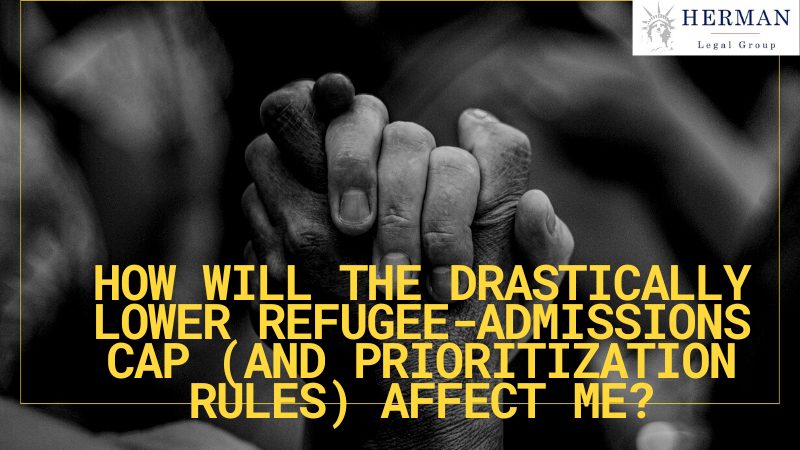Facing deportation can be one of the most terrifying experiences for a lawful permanent resident (LPR) in the United States. The threat of losing your green card, your home, and your family ties is immense. Fortunately, U.S. immigration law provides certain forms of relief — and one of the most significant for LPRs is cancellation of removal.. In Cleveland, Ohio, this form of relief is decided by an immigration judge at the Cleveland Immigration Court.
Individuals facing deportation in Cleveland, Ohio, often have complex immigration needs that require tailored legal strategies, including cancellation of removal.
This complex legal process, primarily governed by Section 240A(a) of the Immigration and Nationality Act (INA), offers a lifeline to many who find themselves in removal proceedings.
This article serves as your comprehensive guide to understanding cancellation of removal options in Cleveland, Ohio. We’ll explore the specific requirements for lawful permanent residents, examine challenges posed by DUI and other criminal convictions, and provide insights into finding the right Cleveland immigration attorney experienced in deportation defense and cancellation of removal.
Need to Know: What Is Cancellation of Removal?
Cancellation of Removal is a discretionary form of relief that allows certain non-citizens — including eligible lawful permanent residents (LPRs) and some non-permanent residents — to avoid deportation and retain (or obtain) a green card despite having committed certain violations or crimes.
Cancellation of removal is typically filed defensively in immigration court as a response to removal proceedings, rather than as an affirmative application.
For lawful permanent residents, this protection comes under INA Section 240A(a).

Cancellation of Removal for Lawful Permanent Residents (INA 240A(a))
Cancellation of removal is not automatic. It is a highly specific, discretionary relief available to permanent residents who meet strict statutory criteria under 8 U.S.C. §1229b(a). This provision recognizes that LPRs with deep community roots and family ties in the United States deserve an opportunity to remain — provided they satisfy the following eligibility requirements, including demonstrating a continuous period of residence and being physically present in the United States continuously as required by law.
Core Eligibility Requirements for LPRs under INA 240A(a)
To qualify for cancellation of removal, a person must generally demonstrate that they:
- Have been a lawful permanent resident for at least five years.You must have held LPR status for five years at the time the Notice to Appear (NTA) was issued.
- Have lived continuously in the U.S. for at least seven years after lawful admission.This is subject to the stop-time rule, which freezes your seven-year clock once you are served an NTA or commit certain offenses.
- Have not been convicted of an aggravated felony.This disqualifies you automatically. Under immigration law, “aggravated felony” is broadly defined and includes certain theft, fraud, and some DUI-related offenses.
- Have demonstrated good moral character.You must show moral integrity over the required residence period. Judges weigh both positive and negative factors, such as community involvement and any criminal record.
- Merit discretionary relief.Even if you meet the legal requirements, immigration judges (IJs) have broad discretion. They balance positive equities — family ties, rehabilitation, employment, property, and community service — against negative ones like recent or serious criminal activity.
- Continuous physical presence.Applicants must have resided continuously in the U.S. for at least 10 years before being served a Notice to Appear for removal proceedings.
For example, a person who has lived in the U.S. for over a decade, has no aggravated felony convictions, and whose family would suffer extreme hardship due to medical needs if they were removed, may meet the eligibility criteria.
To meet these requirements, you must collect extensive documentation to prove your eligibility, including proof of presence and evidence of good moral character. This documentation is critical in demonstrating your compliance with the statutory criteria and strengthening your case before the immigration judge.
Understanding these elements is essential if you’re a green card holder in Cleveland facing deportation due to a DUI or other conviction.
Immigration Services and Non-Permanent Residents
For non-permanent residents in Cleveland, Ohio, facing deportation or removal proceedings, understanding your options under U.S. immigration law is essential. Immigration services tailored to non-permanent residents can make a significant difference in navigating the complex removal process and seeking relief through cancellation of removal.
Unlike lawful permanent residents, non-permanent residents must meet a distinct set of requirements to be eligible for cancellation of removal. The applicant must demonstrate good moral character, maintain continuous physical presence in the United States for at least ten years, and prove that removal would result in exceptional and extremely unusual hardship to qualifying relatives—such as a U.S. citizen or lawful permanent resident spouse, child, or parent. This standard is demanding, and the immigration judge will closely examine the evidence presented to determine if the hardship truly rises to this level.
A qualified immigration attorney plays a vital role in guiding non-permanent residents through every step of the removal process. Your attorney will help you gather and organize the necessary documentation to establish your eligibility. This includes medical records that detail any health issues affecting you or your family members, children’s birth certificates to prove qualifying relationships, school records, pay stubs, rent receipts, and a marriage certificate if applicable. Demonstrating continuous physical presence in the United States for at least ten years is crucial, and you must provide as much evidence as possible—such as utility bills, tax returns, and employment records—to support your claim. Additionally, you must show that you have maintained good moral character throughout this period, which often involves presenting a clean criminal record and evidence of positive community involvement.
The cancellation of removal process for non-permanent residents begins with filing a removal application (Form EOIR-42B) with the immigration court. The immigration judge will review your case, considering your immigration status, any criminal convictions, and the hardship evidence you provide. The burden of proof is on you, the applicant, to establish that you meet all the legal requirements. If the judge grants your application, you may become eligible to apply for a green card, opening the door to lawful permanent resident status and greater security for you and your family.
In removal cases, the stakes are high, and the process can be overwhelming. Working with an experienced attorney increases your chances of a favorable outcome, as they can help you present a compelling case and navigate the intricacies of immigration laws. Community groups and organizations in Cleveland can also offer valuable support, from helping you gather documentation to providing emotional encouragement during this challenging time. In some situations, prosecutorial discretion may be exercised, allowing certain non-permanent residents to remain in the United States even if they are technically eligible for removal.
Ultimately, cancellation of removal offers a critical form of relief for non-permanent residents who can demonstrate good moral character, continuous presence in the United States, and extreme hardship to qualifying relatives. By assembling thorough documentation and working closely with a qualified immigration attorney, you can strengthen your case before the immigration judge and pursue a path toward lawful permanent resident status, protecting your future and your family’s well-being.
Cancellation of Removal for Green Card Holders with DUI Convictions
One of the most common triggers for removal proceedings against LPRs is a DUI conviction. A DUI conviction can significantly impact the outcome of a removal case for a lawful permanent resident, as immigration judges consider the details and severity of the offense when determining eligibility for relief. While a simple DUI does not always lead to deportation, repeat or aggravated DUIs can create major legal complications.
The Nuances of DUI and Immigration Law
The immigration impact of a DUI depends on:
- State vs. Federal Law:
Ohio defines DUI as Operating a Vehicle Impaired (OVI). However, immigration consequences are determined under federal law, not state classification. - Crimes Involving Moral Turpitude (CIMT):
DUIs involving serious injury, recklessness, or multiple offenses may be classified as CIMTs, which can render a lawful permanent resident deportable. - Aggravated Felony Implications:
Simple DUIs typically are not aggravated felonies. But felony DUIs, DUIs causing serious bodily harm, or those connected to substance trafficking can meet the aggravated felony definition, permanently barring cancellation of removal.
The Supreme Court Case: Leocal v. Ashcroft (2004)
In Leocal v. Ashcroft, the U.S. Supreme Court ruled that a DUI is not automatically a “crime of violence” for immigration purposes unless it requires intentional or knowing conduct. This landmark case offered some protection for LPRs — but later decisions have narrowed its scope, especially for DUIs involving serious injury or multiple convictions.
Strategies for LPRs with DUI Convictions
For Cleveland residents seeking cancellation of removal with a DUI record, your immigration attorney will carefully examine:
- The specific Ohio statute and facts of your conviction.
- Plea and sentencing documents.
- Prior criminal history (especially repeat offenses).
- Evidence of rehabilitation and good moral character.
Even if your DUI is not classified as an aggravated felony, it can still weigh negatively in the discretionary analysis, making strong evidence of rehabilitation and family or community support critical. Additionally, applicants must establish that their removal would result in exceptional and extremely unusual hardship to their qualifying relatives, which is a key factor in the judge’s decision.
What to Expect in Removal Proceedings
If you’re an LPR in Ohio facing deportation, you’ll receive a Notice to Appear (NTA) from the Department of Homeland Security (DHS), initiating proceedings before the Cleveland Immigration Court — part of the Executive Office for Immigration Review (EOIR).
Here’s how the process typically unfolds:
- Master Calendar Hearings:Early hearings to confirm charges and announce your intent to seek relief.
- Filing Form EOIR-42A:File [LINK 1] with supporting documentation. You must submit the following documents as essential evidence to support your application: proof of residence, evidence of good moral character, and documentation of hardship to qualifying relatives.
- Individual Merits Hearing:A full evidentiary hearing before an Immigration Judge. You and your lawyer present testimony, witnesses, and evidence.
- Decision:If granted, your removal proceedings end, and your LPR status is preserved. If denied, you can appeal to the [LINK 2]. Denial of a 42B Cancellation of Removal application can be appealed with the Board of Immigration Appeals within 30 days of the decision.
- Appeals Process:Further review may be sought before the [LINK 3], which covers Ohio.
The cancellation of removal process can take years to resolve due to court backlogs, making it essential to act promptly and prepare thoroughly.
- Master Calendar Hearings:Early hearings to confirm charges and announce your intent to seek relief.
- Filing Form EOIR-42A:File Form EOIR-42A (Application for Cancellation of Removal for Certain Permanent Residents) with supporting documentation. You must include the following documents: proof of residence, evidence of good moral character, and hardship evidence to support your application. Non-permanent residents, however, must file Form EOIR-42B to apply for cancellation of removal.
- Individual Merits Hearing:A full evidentiary hearing before an Immigration Judge. You and your lawyer present testimony, witnesses, and evidence.
- Decision:If granted, your removal proceedings end, and your LPR status is preserved. If denied, you can appeal to the Board of Immigration Appeals (BIA).
- Appeals Process:Further review may be sought before the U.S. Court of Appeals for the Sixth Circuit, which covers Ohio.
The Critical Role of an Experienced Cleveland Immigration Attorney
Navigating cancellation of removal is legally and procedurally complex. The interplay between criminal convictions and immigration law demands deep expertise. The 42B Cancellation of Removal process is not automatic and requires applicants to submit a detailed application and often appear before an immigration judge.
A seasoned Cleveland immigration lawyercan help by:
- Assessing your eligibility under INA §240A(a).
- Analyzing whether your convictions qualify as CIMTs or aggravated felonies.
- Gathering strong evidence of rehabilitation and community ties.
- Representing you in hearings and appeals before EOIR and the BIA.
- Ensuring all filings and evidence meet strict procedural deadlines.
Top Immigration Law Firms in Cleveland for Cancellation of Removal Defense
When facing deportation, working with a firm experienced in criminal-immigration crossover cases is essential. The following Cleveland-area firms are highly regarded:
- Herman Legal Group – Led by Richard T. Herman, Esq., this nationally respected immigration law firm has represented immigrants across the U.S. for more than 30 years. Their multilingual team provides expert representation in cancellation of removal, deportation defense, and DUI-related immigration cases.
- Margaret W. Wong & Associates LLC – Based in downtown Cleveland, this firm has extensive experience in deportation defense, asylum, and family immigration cases.
- Robert Brown LLC – Known for handling complex criminal-immigration intersections and federal appeals nationwide.
These Cleveland-based law firms provide strong representation for individuals facing removal due to DUIs, aggravated felonies, or other criminal convictions.
Key Considerations When Choosing a Cleveland Immigration Lawyer
When researching the best immigration attorney in Cleveland, Ohio, for cancellation of removal, look for lawyers who:
- Specialize in removal defense (not just general immigration).
- Understand Ohio criminal law and its federal immigration impact.
- Have proven experience before the Cleveland Immigration Court.
- Offer transparent communication and realistic case assessments.
- Are well-reviewed by clients for compassion and responsiveness.
A knowledgeable deportation defense attorney can mean the difference between permanent separation from family and a successful legal outcome that preserves your life in the United States.
Final Thoughts: Protecting Your Status and Future
If you are a lawful permanent resident in Cleveland, Ohio, and have received a Notice to Appear — especially due to a DUI or other criminal conviction — you must act quickly. Cancellation of removal may offer you a chance to stay, but eligibility, timing, and presentation are everything. In many cases, demonstrating exceptional hardship to a U.S. citizen spouse is a key factor in qualifying for cancellation of removal.
Seek experienced legal representation immediately. Attorneys with decades of immigration court experience — like those at the Herman Legal Group — can help you navigate this complex process, advocate effectively before the Immigration Judge, and, when needed, pursue appeals to preserve your right to remain in the United States.
Author Bio / Profile

Richard T. Herman, Esq. is a nationally recognized immigration lawyer with over 30 years of experience helping individuals and families navigate U.S. immigration law. Founder of the Herman Legal Group — known as “The Law Firm for Immigrants” — he leads a multilingual team representing clients across all 50 states.
Richard is co-author of Immigrant, Inc and a frequent legal analyst on immigration policy.
To learn more or schedule a confidential consultation, visit the Herman Legal Group consultation page.
Key Takeaways
- Cancellation of removal may allow permanent residents in deportation proceedings to keep their green card.
- Eligibility requires 5 years as an LPR, 7 years of residence, and no aggravated felony conviction.
- DUI convictions can complicate eligibility but do not always disqualify an applicant.
- Representation by an experienced Cleveland immigration lawyer is critical.
- Herman Legal Group, led by Richard T. Herman, provides seasoned defense for LPRs across Ohio and nationwide.








